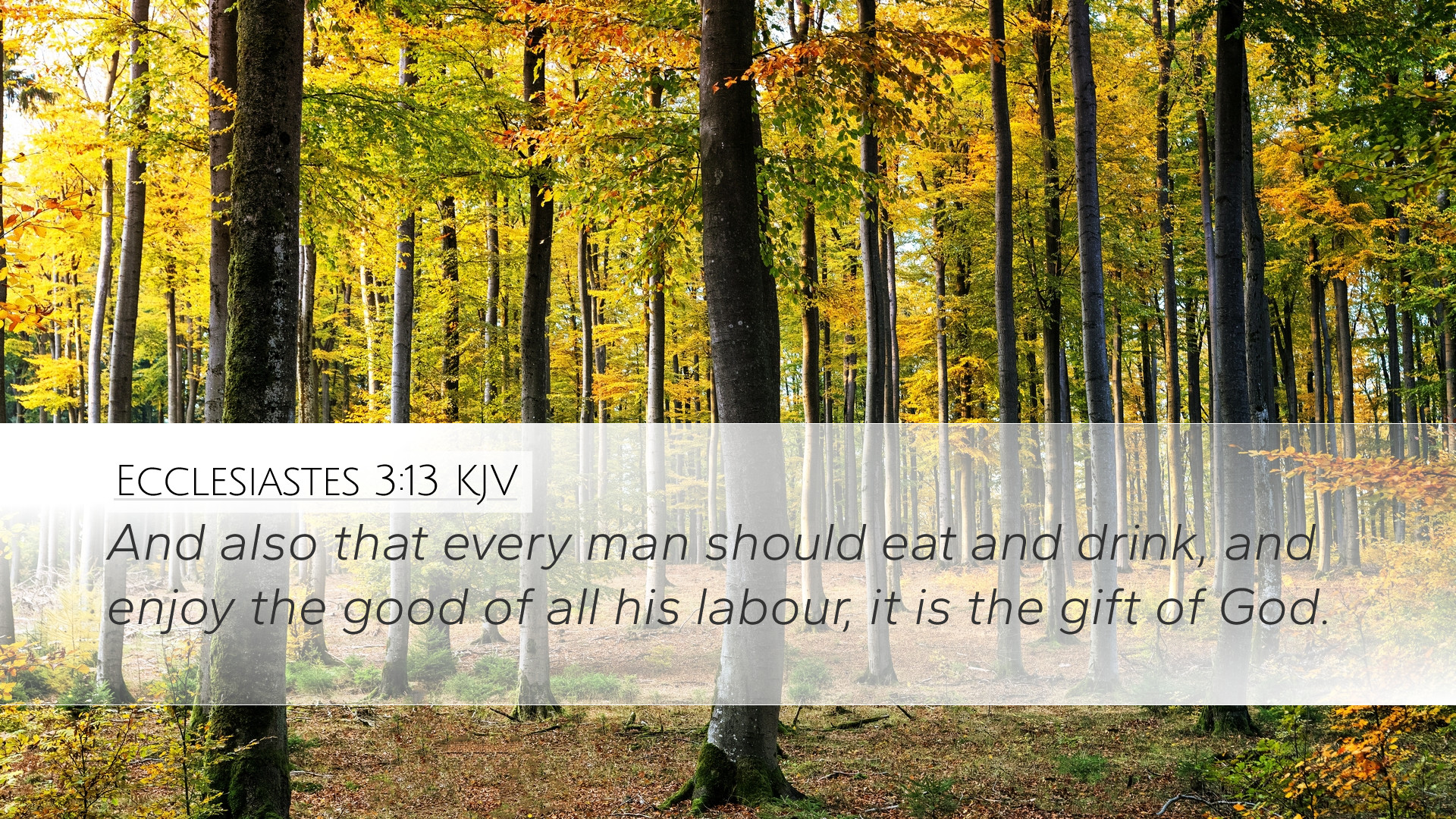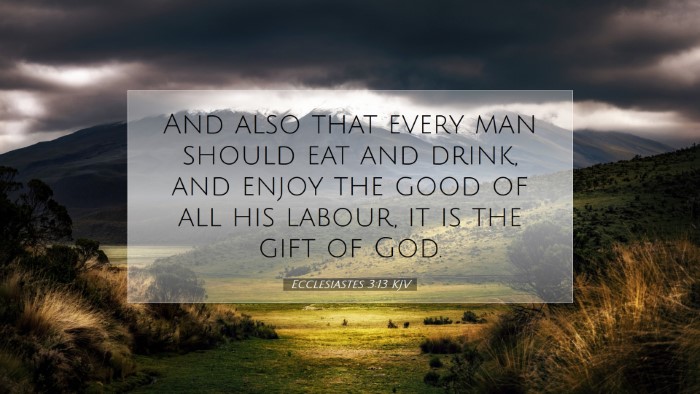Commentary on Ecclesiastes 3:13
Ecclesiastes 3:13 (ESV): "Also that everyone should eat and drink and take pleasure in all his toil—this is God's gift to man."
Introduction
This passage from Ecclesiastes serves as a profound reflection on the human experience, particularly regarding work, enjoyment, and divine providence. In this commentary, we will explore insights from renowned public domain theologians, including Matthew Henry, Albert Barnes, and Adam Clarke, to glean a deeper understanding of this verse.
Contextual Background
The Book of Ecclesiastes, traditionally attributed to Solomon, offers a critical analysis of the meaning of life and the inherent futility of human endeavors without God. The broader context of Chapter 3 speaks to the seasons of life, emphasizing the cyclical nature of human experiences.
Exegesis of the Verse
This verse encapsulates the essence of enjoying life's simple pleasures as a gift from God. Theological reflections on this passage highlight the following key themes:
- The Gift of Enjoyment: Matthew Henry remarks that the ability to "eat and drink" signifies a divine allowance for earthly enjoyment. He emphasizes that pleasure in our labor is not merely an accident but a gift from God, meant to be received with gratitude.
- Human Toil: Albert Barnes notes that the phrase "all his toil" reflects the inherent dignity of work in a believer’s life. He suggests that God desires for us to find satisfaction in our labors, despite their fleeting nature.
- Theology of Work: Adam Clarke highlights that work is ordained by God and, through it, we can derive joy. He encourages believers to view their labor as sacred, contributing to the common good and their personal fulfillment.
The Nature of Work and Pleasure
Exploring the dual concepts of work and pleasure reveals a nuanced biblical perspective:
- Balance in Life: This verse implies a balance between the rigors of work and the enjoyment of its fruits. Henry suggests that neglecting to enjoy the fruits of one’s labor leads to discontent and disillusionment in life.
- Gratitude for God's Provision: The enjoyment found in daily activities is ultimately to be recognized as coming from God. Barnes states that we should therefore live with a sense of gratitude and awareness of God's sovereignty.
- A Call to Present Living: Clarke points out the importance of present enjoyment over future worries. He stresses that the present moment is a gift and should be embraced as such.
Theological Implications
- Divine Providence: The verse illustrates God's role in human endeavors. It reinforces the notion that God is intimately involved in the everyday lives of people. Clarke emphasizes that life’s enjoyment and toil come from God’s goodness.
- Redemptive Perspective: Understanding this verse through a New Testament lens can reveal the redemptive nature of work in Christ. While Ecclesiastes articulates the temporal aspects of work, believers today are called to view work as part of their identity in Christ, infused with eternal significance.
- Encouragement for Believers: This scripture encourages believers to seek joy in labor, aligning with Psalm 128:2, which states that "You shall eat the fruit of the labor of your hands; you shall be blessed, and it shall be well with you."
Practical Applications
Applying the truths of Ecclesiastes 3:13 in daily life involves both an attitude adjustment and practical steps:
- Embrace Gratitude: Regularly reflect on and express gratitude for the small blessings in life—food, drink, companionship, and work.
- Work as Worship: Approach work as an act of worship. This transforms labor from a mundane activity into a sacred endeavor that honors God.
- Cultivate Enjoyment: Make a conscious effort to enjoy the fruits of your labor. This could mean setting aside time to celebrate achievements or simply enjoying meals with family and friends.
Conclusion
Ecclesiastes 3:13 encapsulates a transformative understanding of work and pleasure as gifts from God. It prompts believers, theologians, and students of the Bible to reflect on the importance of taking joy in their labors and recognizing divine provision in their lives. As we navigate our earthly journeys, let us savor the moments, appreciating them as threads woven into God's grand design.


